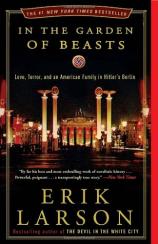In the Garden of Beasts: Love, Terror, and an American Family in Hitler's Berlin
Review
In the Garden of Beasts: Love, Terror, and an American Family in Hitler's Berlin
William E. Dodd, a professor of history at the University of Chicago, has become the United States ambassador to Germany. His timing couldn't have been much worse.
World War I has ended, and Germans are in the process of rebuilding their country. At the same time, a power-hungry man named Adolf Hitler is poised to place himself at the head of the new Germany. This is the dawn of the Nazi stranglehold.
In late spring of 1933, Ambassador Dodd packs up his family, along with his suitcases and old Chevrolet, and the four of them board a ship for the journey across the Atlantic. He takes with him fond memories of his earlier years in Leipzig, where he once studied and germinated a love for the German people. Now he hopes to instill that love in his daughter Martha, his son Bill, and his wife Mattie.
Dodd exudes a professorial air and frugality, qualities that his detractors point to in arguing against his suitability for the diplomatic post. In contrast, Martha is nearly his polar opposite. She has a carefree attitude with a somewhat blatant disregard for proprieties. What she shares with her father is a belief in Hitler's sincerity when he claims to be working toward world peace. While the ambassador takes his duties seriously, his adult children enjoy what Berlin has to offer in the way of entertainment. Martha's favorite pastime seems to be stealing men's hearts, for she gathers scores of them, including some highly placed in the Nazi party. At one time, a few even looked at her as an ideal companion for Hitler, and her sympathies would seem to bolster that view.
But soon Dodd finds that he cannot dismiss the obvious. An uneasy feeling sets in, along with an increasing realization of Germany's blind descent into Hitler's world. It becomes a perfect storm of personalities and circumstances. German President Hindenburg's impending death has allowed Hitler to make a devil's deal to ensure his absolute power. An atypical tyrant, Hitler's unassuming demeanor --- in the beginning --- has people underestimating him. But as his power grows, so does his rage and the frequency of his tantrums.
Dodd thinks it perplexing that few people find Hitler's extreme views unsettling. The slow condemnation of the Jews has little overt opposition. Even Dodd exhibits an initial reticence to quell the swelling tide of anti-Semitism. Hitler has men such as Goebbels, Goring and Himmler advising him. As the reports --- many of which are false --- progressively frustrate him, his frenzy escalates to the bursting point. He explodes with brutality, ordering "the purge," a spate of arrests and executions carried out to eradicate enemies of the government. No trials were held. Men and women were simply killed at Hitler's whim.
Hitler's rise was subtle and insidious. Under the guise of rebuilding after World War I and with assurances of adhering to the Treaty of Versailles, Germany lulled the world into a false sense of security and trust. IN THE GARDEN OF BEASTS covers William Dodd's tenure as ambassador in Berlin, which was cut short by his own enemies back home. Had he been allowed to stay, he might have changed the course of America's involvement in World War II. But with Hitler as his adversary, it seems unlikely. You decide.
Erik Larson tackles this outstanding period of history as fully and compellingly as he portrayed the events in his bestseller, THE DEVIL IN THE WHITE CITY. With each page, more horrors are revealed, making it impossible to put down. IN THE GARDEN OF BEASTS reads like the true thriller it is.
Reviewed by Kate Ayers on June 6, 2011
In the Garden of Beasts: Love, Terror, and an American Family in Hitler's Berlin
- Publication Date: May 1, 2012
- Genres: History, Nonfiction
- Paperback: 480 pages
- Publisher: Broadway
- ISBN-10: 030740885X
- ISBN-13: 9780307408853





